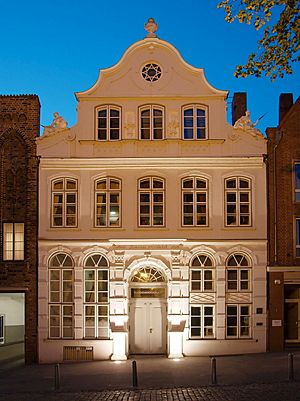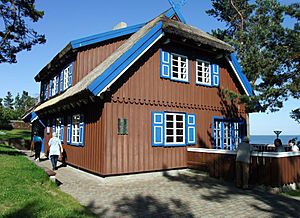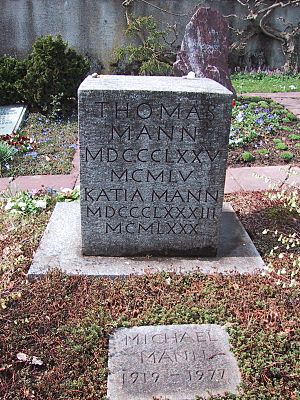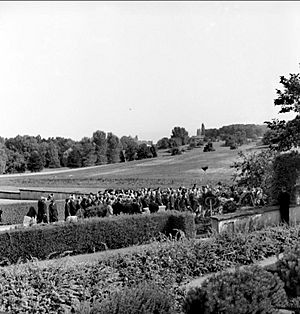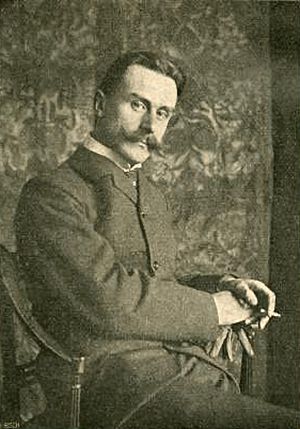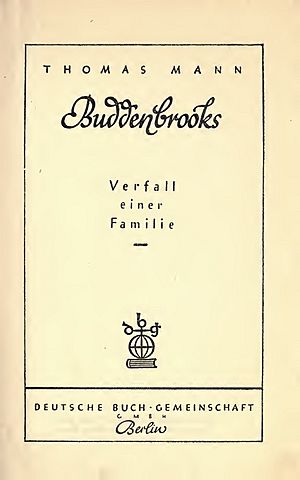Thomas Mann facts for kids
Quick facts for kids
Thomas Mann
|
|
|---|---|

Thomas Mann in 1929
|
|
| Born | 6 June 1875 Free City of Lübeck, German Empire |
| Died | 12 August 1955 (aged 80) Zürich, Switzerland |
| Resting place | Kilchberg, Switzerland |
| Occupation |
|
| Education | |
| Period | 1896–1954 |
| Genre | Novel, novella |
| Notable works | Buddenbrooks, The Magic Mountain, Death in Venice, Joseph and His Brothers, Doctor Faustus |
| Notable awards |
|
| Spouse | Katia Pringsheim |
| Children | Erika, Klaus, Golo, Monika, Elisabeth, Michael |
| Relatives | Thomas Johann Heinrich Mann (father) Júlia da Silva Bruhns (mother) Heinrich Mann (brother) |
| Signature | |
 |
|
Paul Thomas Mann (born June 6, 1875 – died August 12, 1955) was a famous German writer. He wrote novels, short stories, and essays. In 1929, he won the Nobel Prize in Literature.
Mann's stories often explored the minds of artists and thinkers. He used old German and Biblical tales in new ways. He also used ideas from famous thinkers like Johann Wolfgang von Goethe and Friedrich Nietzsche.
He came from a well-known family in Lübeck, Germany. His first novel, Buddenbrooks, was about his own family. His older brother, Heinrich Mann, was also a writer. Three of Thomas Mann's six children became important German writers too.
When Adolf Hitler came to power in 1933, Mann left Germany for Switzerland. Later, during World War II, he moved to the United States. He returned to Switzerland in 1952. Mann is known as one of the most important writers who wrote in exile. These were German writers who opposed Hitler's rule.
Contents
A Look at Thomas Mann's Life
Thomas Mann was born into a wealthy family in Lübeck. He was the second son of Thomas Johann Heinrich Mann. His father was a senator and a grain merchant. His mother, Júlia da Silva Bruhns, was from Brazil. She had German and Portuguese family roots.
His father died in 1891. After this, his family moved to Munich. Mann first studied science in school in Lübeck. Then he went to universities in Munich. He studied history, economics, art, and literature. He was preparing for a career in journalism.
| Name | Birth | Death |
|---|---|---|
| Erika | 9 November 1905 | 27 August 1969 |
| Klaus | 18 November 1906 | 21 May 1949 |
| Golo | 29 March 1909 | 7 April 1994 |
| Monika | 7 June 1910 | 17 March 1992 |
| Elisabeth | 24 April 1918 | 8 February 2002 |
| Michael | 21 April 1919 | 1 January 1977 |
Mann lived in Munich from 1891 until 1933. He spent one year in Italy with his older brother, Heinrich. Thomas also worked for an insurance company for a short time.
His writing career began when he wrote for a magazine called Simplicissimus. His first short story, "Little Mr Friedemann," was published in 1898.
In 1905, Mann married Katia Pringsheim. She came from a wealthy Jewish family. They had six children together.
Life During the World Wars
In 1912, Thomas and Katia moved to a special hospital (sanatorium) in Davos, Switzerland. This place later inspired his 1924 novel, The Magic Mountain. He was worried about the growing tensions between Germany and France. He was also upset when World War I began.
In 1929, Mann had a small house built in a fishing village called Nidden. This village is now in Lithuania. He spent his summers there from 1930 to 1932. He worked on his novel Joseph and His Brothers there. Today, his cottage is a museum.
In 1933, Mann was traveling in France. His children told him it was not safe to return to Germany. The family then moved to Switzerland. In 1936, they became citizens of Czechoslovakia.
In 1939, Germany took over Czechoslovakia. Mann then moved to the United States. He lived in Princeton, New Jersey, and taught at Princeton University. In 1942, his family moved to Los Angeles, California. They were important members of the German community there. Many other German writers and artists also lived in Los Angeles. On June 23, 1944, Thomas Mann became a citizen of the United States. The Mann family lived in Los Angeles until 1952.
Speaking Out Against the Nazis
When World War II started in 1939, Mann began giving anti-Nazi speeches. He spoke in German to the German people through the BBC. From October 1940, he made monthly broadcasts. He recorded them in the U.S., and they were sent to London. The BBC then broadcast them to Germany.
In these speeches, Mann criticized Hitler and his followers. He called them crude and out of touch with European culture. He once said, "The war is horrible, but it has the advantage of keeping Hitler from making speeches about culture."
Mann was one of the few German writers in the U.S. who openly opposed Nazism. After the war, he spoke about why people who suffered under the Nazis might want Germany to be held responsible. He also hoped that enemies might rethink revenge.
His Final Years
As the Cold War began, Mann became frustrated with rising McCarthyism. This was a time in the U.S. when people were accused of being communists. Mann was called a "suspected communist." He had to testify to the House Un-American Activities Committee.
Mann was not a communist, but he was not against them either. He spoke out against the accusations. He said, "Spiritual intolerance, political inquisitions, and declining legal security... That is how it started in Germany." He protested against people being jailed or fired for their beliefs.
Because of this, he found it hard to get his views published. He was forced to leave his job at the Library of Congress. In 1952, he moved back to Switzerland. He lived in Kilchberg, near Zürich. He never lived in Germany again, but he visited often. In 1949, he visited Germany for Johann Wolfgang von Goethe's 200th birthday. This showed that German culture was still important, even with new political borders.
His Death
After his 80th birthday, Mann went on vacation in the Netherlands. On July 18, 1955, he felt pain in his left leg. Doctors diagnosed a blood clot. He was taken to a hospital in Zürich. He died on August 12, 1955.
Later, doctors found that his condition had been misdiagnosed. He had a burst artery, which caused internal bleeding. At that time, surgery to fix this was not possible. Thomas Mann was buried in Kilchberg, Switzerland.
His Lasting Impact
Thomas Mann's writings influenced many other authors. Many places are named after him, like the Thomas Mann Gymnasium in Budapest.
Thomas Mann's Writing Career
Blanche Knopf, a publisher from America, met Mann in Europe. She became his American publisher. She hired Helen Tracy Lowe-Porter to translate his books into English.
After his novel Buddenbrooks became popular, his publishers sent him an extra payment. Later, in the 1930s, Blanche Knopf helped Mann and his family move to America.
Winning the Nobel Prize
Mann received the Nobel Prize in Literature in 1929. He was recognized mainly for his popular novel Buddenbrooks (1901) and The Magic Mountain (1924). His many short stories were also noted.
Buddenbrooks tells the story of a merchant family in Lübeck. It shows how the family declines over four generations. This novel was based on Mann's own family.
The Magic Mountain follows an engineering student. He plans to visit his sick cousin at a Swiss sanatorium for a few weeks. But he ends up staying much longer. During his stay, he learns about medicine and meets many different people. These characters represent different ideas and problems in Europe at the time.
His long novel series Joseph and His Brothers was written over 16 years. It is one of his biggest and most important works.
Later novels included Lotte in Weimar: The Beloved Returns (1939). This book returned to the world of Goethe's famous novel. Doctor Faustus (1947) tells the story of a made-up composer. It explores how German culture was affected before and during World War II. Confessions of Felix Krull (1954) was unfinished when Mann died.
Thomas Mann's Political Views
During World War I, Mann supported the German government. He was against liberalism and supported the war. He called the war "a purification, a liberation, an enormous hope." In his book Reflections of a Nonpolitical Man (1918), Mann shared his conservative ideas. He valued German traditions and patriotism.
Later, his political views changed. He began to support democracy. In 1923, he urged German thinkers to support the new Weimar Republic. He gave a speech in Berlin in 1930 called "An Appeal to Reason." In it, he strongly spoke out against Nazism. He encouraged people to resist the Nazis. He also showed more sympathy for socialist ideas.
When the Nazis took power in 1933, Mann was on vacation. His son advised him not to return to Germany. Unlike his brother's and son's books, Mann's books were not burned by the Nazis. This might be because he had won the Nobel Prize. In 1936, the Nazi government officially took away his German citizenship.
During the war, Mann made many anti-Nazi radio speeches. These were published as Listen, Germany! in 1943. He recorded them in the United States. The BBC then broadcast them to Germany. He hoped German listeners would hear his message.
Thomas Mann's Literary Works
Plays
- 1905: Fiorenza
Short Stories
- 1896: "The Will to Happiness"
- 1896: "Disillusionment"
- 1896: "Little Herr Friedemann"
- 1897: "Death"
- 1897: "The Clown"
- 1898: "Tobias Mindernickel"
- 1900: "Luischen" ("Little Lizzy")
- 1900: "The Road to the Churchyard"
- 1903: "The Child Prodigy"
- 1911: "The Fight between Jappe and the Do Escobar"
Novels
- 1901: Buddenbrooks
- 1909: Royal Highness
- 1924: The Magic Mountain
- 1939: Lotte in Weimar: The Beloved Returns
- 1947: Doctor Faustus
- 1951: The Holy Sinner
Series
Felix Krull
- Felix Krull (1922)
- Confessions of Felix Krull (1954) (unfinished)
Joseph and His Brothers (1933–43)
- The Stories of Jacob (1933)
- Young Joseph (1934)
- Joseph in Egypt (1936)
- Joseph the Provider (1943)
Novellas
- 1903: Tristan
- 1903: Tonio Kröger
- 1912: Death in Venice
- 1918: A Man and His Dog
- 1925: Disorder and Early Sorrow
- 1930: Mario and the Magician
- 1940: The Transposed Heads
- 1944: The Tables of the Law
- 1954: The Black Swan
Essays
- 1918: "Reflections of a Nonpolitical Man"
- 1922: "The German Republic"
- 1930: "A Sketch of My Life" (about his own life)
- 1943: Listen, Germany! (collection of speeches)
Images for kids
See also
 In Spanish: Thomas Mann para niños
In Spanish: Thomas Mann para niños
 | William M. Jackson |
 | Juan E. Gilbert |
 | Neil deGrasse Tyson |


